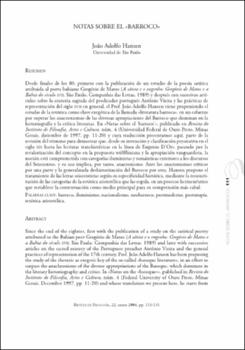Notas sobre el "barroco"
Autor
Hansen, João AdolfoFecha
2004Resumen
Desde finales de los 80, primero con la publicación de un estudio de la poesía satírica
atribuida al poeta bahiano Gregório de Matos (A sátira e o engenho: Gregório de Matos e a
Bahia do século XVII, São Paulo, Companhia das Letras, 1989) y después con sucesivos artículos
sobre la oratoria sagrada del predicador portugués Antônio Vieira y las prácticas de
representación del siglo XVII en general, el Prof. João Adolfo Hansen viene proponiendo el
estudio de la retórica como clave exegética de la llamada «literatura barroca», en un esfuerzo
por superar los anacronismos de las diversas apropiaciones del Barroco que dominan en la
historiografía y la crítica literarias. En «Notas sobre el ‘barroco’», publicado en Revista do
Instituto de Filosofia, Artes e Cultura, núm. 4 (Universidad Federal de Ouro Preto, Minas
Gerais, diciembre de 1997, pp. 11-20) y cuya traducción presentamos aquí, parte de la
revisión del término para demostrar que, desde su invención y clasificación peyorativa en el
siglo XIX hasta las lecturas transhistóricas en la línea de Eugenio D’Ors, pasando por la
revalorización del concepto en la propuesta wölffliniana y la apropiación vanguardista, la
noción está comprometida con categorías iluministas y románticas exteriores a los discursos
del Seiscientos, y su uso implica, por tanto, anacronismo. Ante los anacronismos críticos
por una parte y la generalizada deshistorización del Barroco por otra, Hansen propone el
tratamiento de las letras seiscentistas según su especificidad histórica, mediante la reconstitución
de las categorías de la retórica aristotélica que las regula, en un proceso hermenéutico
que restablece la contextuación como medio principal para su comprensión más cabal. Since the end of the eighties, first with the publication of a study on the satirical poetry
attributed to the Bahian poet Gregório de Matos (A sátira e o engenho: Gregório de Matos e
a Bahia do século XVII, São Paulo, Companhia das Letras, 1989) and later with successive
articles on the sacred oratory of the Portuguese preacher Antônio Vieira and the general
practices of representation of the 17th century, Prof. João Adolfo Hansen has been proposing
the study of the rhetoric as exegetic key of the so-called «baroque literature», in an effort to
surpass the anachronisms of the diverse appropriations of the Baroque, which dominate in
the literary historiography and critics. In «Notes on the «baroque»», published in Revista do
Instituto de Filosofia, Artes e Cultura, núm. 4 (Federal University of Ouro Preto, Minas
Gerais, December 1997, pp. 11-20) and whose translation we present here, he starts from the review of the term to prove that, from its invention and pejorative classification in the
19th century to the trans-historical readings in the line of Eugenio D’Ors, passing by the
re-valorisation of the concept in Wölfflin’s proposal and the avant-garde appropriation, the
notion is compromised with illuminist and romantic categories alien to the speeches of the
17th century, and therefore, their use implies anachronism. Facing these anachronisms, on
one hand, and the general de-historisation of the Baroque, on the other, Hansen insists on
examining seventeenth-century literature within all its historical peculiarity, identifying
and demonstrating both the existence and significance of the categories of Aristotelian
rhetoric which exercised enormous influence on creative production. When carrying out
his hermeneutic analysis, Hansen rehabilitates contextualization as the principal means for
achieving fuller comprehension of 17th century literature.





